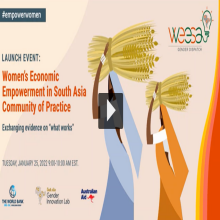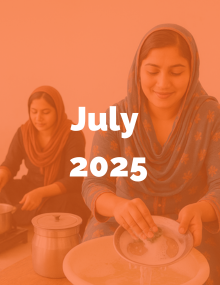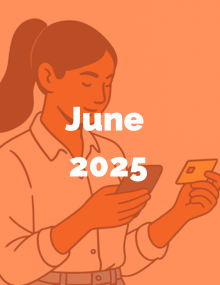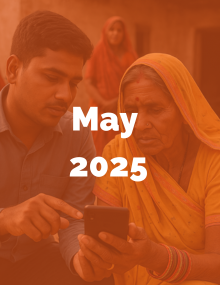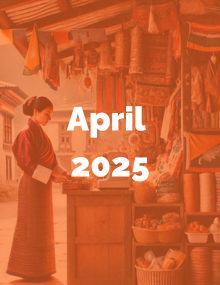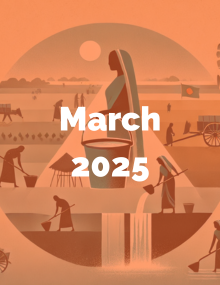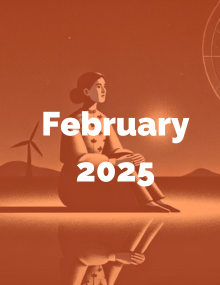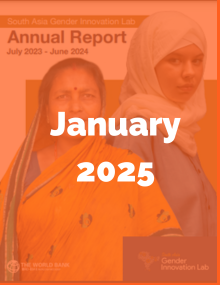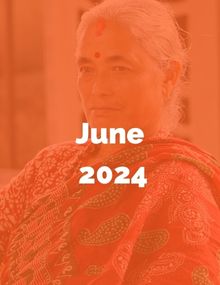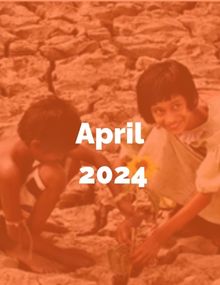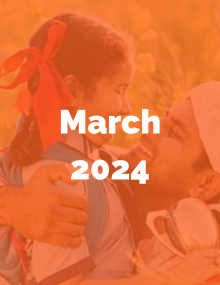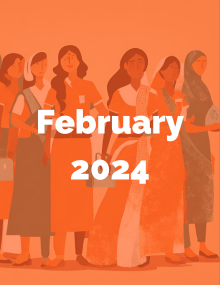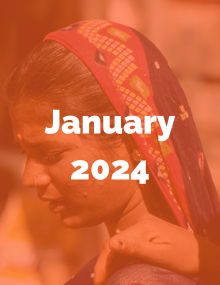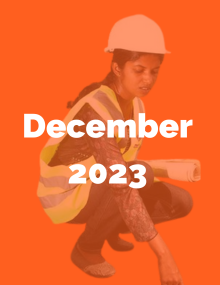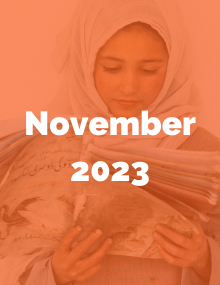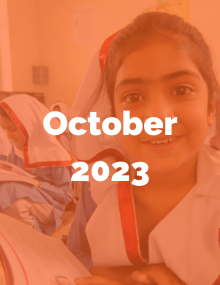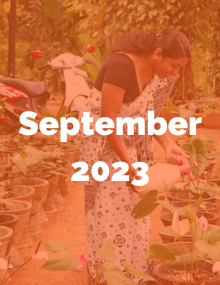
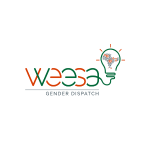
MONTHLY DIGESTS
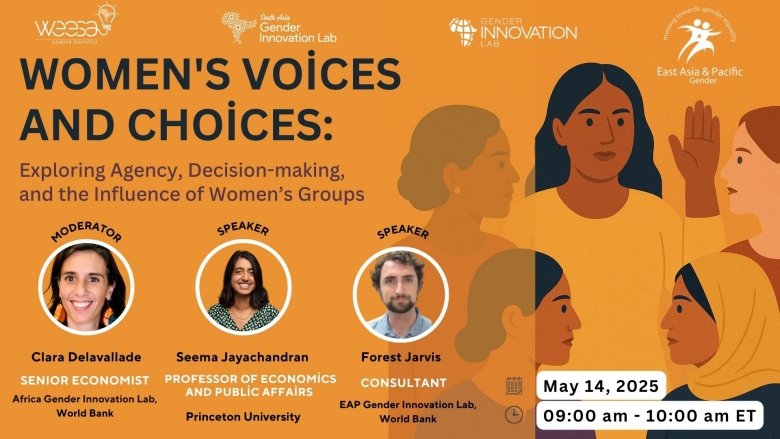
Women's Voices and Choices: Exploring Agency, Decision-making, and the Influence of Women’s Groups
WEESA’s final Spring learning event for 2025 explored decision-making, agency, and the impact of group models. Drawing on unique data from the rural Philippines and analyzing the causal mechanisms through which groups improve outcomes for women and girls in low- and middle-income countries, the speakers shared key findings and discussed implications for measurement, programming, and future research.
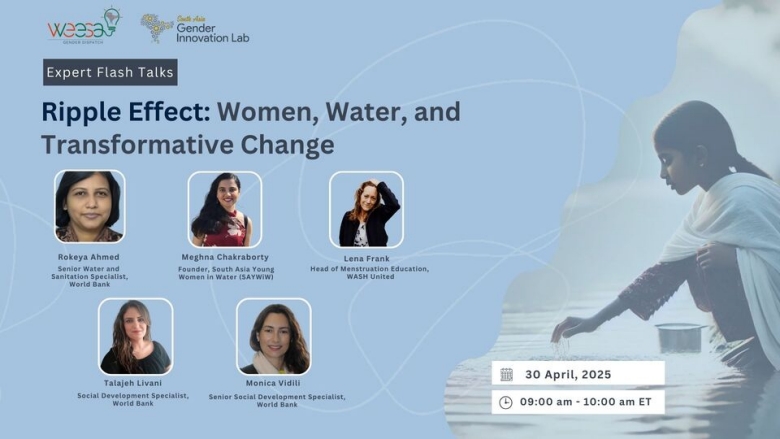
Ripple Effect: Women, Water, and Transformative Change
The event featured an engaging series of flash talks that explored the connections between water and women’s empowerment. It highlighted how women’s leadership, employment, and entrepreneurship are driving innovative solutions in the water sector—challenging gender inequalities and expanding access to clean water and sanitation for all.
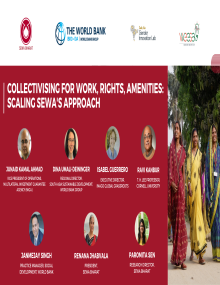
Collectivising For Work, Rights, Amenities: Scaling SEWA’s Approach
Speakers delve into the evolution of India's Self-Employed Women's Association (SEWA), a model of collectivization that has successfully empowered millions of women through building resilience and livelihood opportunities. They discuss the significant contributions of women workers in the informal sector and the potential to scale this approach, drawing on key insights from the recent research study, "Collectivizing for Work, Rights, Amenities: Scaling SEWA's Approach, which was supported by SAR GIL and the World Bank.
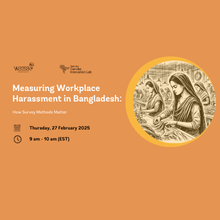
Measuring Workplace Harassment in Bangladesh: How Survey Methods Matter
Collecting data on workplace harassment is challenging as it often goes unreported because of fear of retaliation and stigma. This eye-opening learning event offers insights from an innovative study at a Bangladeshi apparel firm that experimented with secure survey designs and uncovered harassment that traditional surveys and internal reporting often miss — including by supervisors against subordinate women and men.
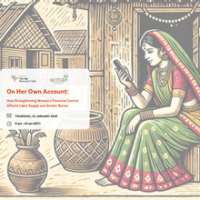
On Her Own Account: How Strengthening Women's Financial Control Affects Labor Supply and Gender Norms
Can greater control over earned income incentivize women to work and influence gender norms? This study draws on a large-scale randomized control trial conducted across 197 village clusters in Madhya Pradesh, India, to explore the connection between economic policy, female labor force participation, and norms. Join us to learn more about how large-scale policies that reshape behavioral incentives can drive normative change in contexts with restrictive gender norms, empowering women to work outside the home, enhance their economic autonomy, and strengthen their household bargaining power.

Addressing GBV and Gender Biases in the Workplace: Evidence from an Expressive Arts Intervention in India
Can artistic expression and theatre be used to improve policing quality in addressing GBV? This learning event discusses the impacts from a randomized control trial in Bihar, India, that studied the causal effect of a novel intervention that used expressive arts pedagogy for police officers on technical and soft skills, norms and behaviors regarding GBV. Learn more about this intervention, its effectiveness in addressing GBV, and the impact on interactions between women and officers.

Empower to Prosper: Women Working for Growth in South Asia
Only 32% of South Asian women of working age participate in the labor force, far below the average of 54% for emerging market and developing economies (EMDEs). This learning event takes an in-depth look at the drivers and implications of women's low labor force participation rates in South Asia. It examines primary factors affecting female labor force participation, including impacts of development and structural change on labor demand, supply constraints and labor market frictions, and legal frameworks and social norms.

Barriers to Entry: The Gender Gap in Job Search in Urban Pakistan
Gender gaps in labor market outcomes persist in South Asia. An open question is whether supply or demand side constraints play a larger role. We investigate this using matched data from three sources in Lahore, Pakistan: representative samples of jobseekers and employers; administrative data from a job matching platform; and an incentivized binary choice experiment. Employers’ gender restrictions are a larger constraint on women’s job opportunities than supply-side decisions. This demand-side gap in quantity of job opportunities closes as education levels increase and jobs become more "white-collar."

Can New Technology in Financial Transfers Empower Women? Evidence from Pakistan and Bangladesh
Even when women receive wages or cash transfers there is no guarantee that they will have access to and control over that money. We are delighted to offer a learning event focusing on evidence from an impact evaluation and randomized controlled trial (RCT) which explore how new technologies impact women’s economic empowerment in Bangladesh and Pakistan. The RCT in Bangladesh worked with HelloTask, a gig economy platform that connects female domestic workers in Dhaka to short-term opportunities, examining the impact of training in digital financial services and payment via mobile money (or in person payment) on women’s control over finances and wages. The study in Pakistan evaluated how changes in the delivery system for unconditional cash transfers impacted women’s collection of and control over the cash received, and also identified important policy implications for cash transfers.

Empowering Adolescent Girls: Insights, Challenges, and Strategies - A Preview of Findings from the Africa Region
What are the potential pathways for advancing gender equality and empowering adolescent girls? Our next learning event offers a preview of the Africa Regional Report, focusing on the crucial theme of empowering adolescent girls in Africa – with insights and lessons learned applicable to South Asia and elsewhere. This report is a collaboration between the World Bank (Africa GIL in the Africa Chief Economist Office and Human Development Practice Group), The Center for Global Development, and the Population Council. Presentations will walk participants through a conceptual framework for understanding adolescent girls’ empowerment, delve into the unique challenges faced by them in Africa, and highlight effective strategies for promoting their empowerment and the path forward.
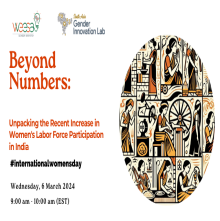
Beyond Numbers: Unpacking the Recent Increase in Women's Labor Force Participation in India
After consistently low rates of female labor force participation over the last two decades in India, why are the numbers starting to tick up? Is it about norms? Or measurement? Or something else entirely? Learn more by joining us for a presentation by the distinguished academic, Ashwini Deshpande, who will discuss her recent research which takes a deep dive into data from India's Periodic Labor Force Surveys and examines other factors that may be influencing outcomes – to better understand this emerging trend. Adding to this insightful presentation will be commentaries by the World Bank’s Maurizio Bussolo, Lead Economist at the Chief Economist Office for South Asia, and Soumya Kapoor Mehta, Senior Social Development Specialist and Co-lead of the India Gender and Inclusion Platform
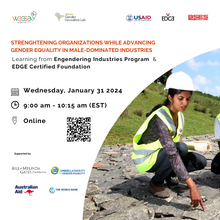
Strengthening Organizations while Advancing Gender Equality in Male-Dominated Industries: Learning from USAID’s Engendering Industries Program and EDGE Certified Foundation
Advancing gender equality in the workplace remains a significant challenge, particularly in industries traditionally dominated by men. This learning event examines the strategies and approaches used by USAID’s Engendering Industries Program and the EDGE Certified Foundation to advance gender equality. Speakers will discuss their approaches, share challenges, and explore how strategies and solutions have evolved over time. Over the past seven years, Engendering Industries has supported 67 companies across 38 countries to hire and promote over 12,900 women. Engendering Industries' utility partner in India, BSES Rajdhani Power Limited, will offer first-hand insight into the application of this approach in India. In addition, we are pleased to feature insights from the EDGE Certified Foundation – the custodian behind EDGE Certification, the leading standards for diversity, equity, and inclusion, centred on a gender and intersectional equity approach.
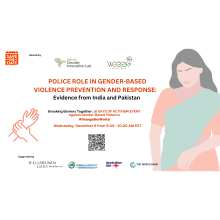
Police Role in Gender-Based Violence Prevention and Response: Evidence from India and Pakistan
Inadequate police responsiveness to rising yet under-reported gender-based violence has prompted reforms which seek to increase accessibility and accountability. However, most of these reforms have not been rigorously studied and the limited evidence that has been available is mixed, if not pessimistic, especially within patriarchal settings. Drawing on findings from a large-scale randomized controlled trial of a police reform in Madya Pradesh, India, and a community policing initiative in Pakistan, this learning event examines the role of police and efficacy of ongoing reforms. The findings offer evidence of what is working, with policy implications as governments in South Asia and elsewhere consider gender-targeted police reforms.
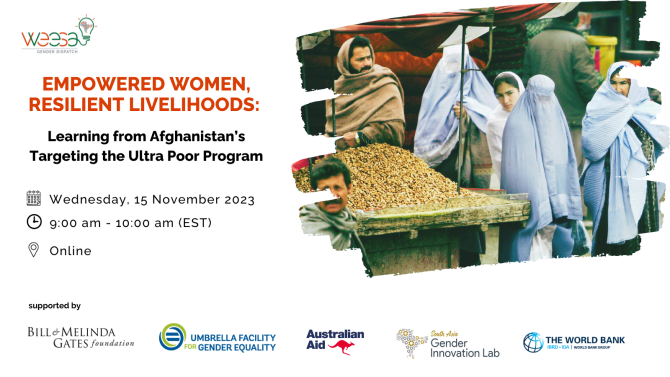
Empowered Women, Resilient Livelihoods: Learning from Afghanistan’s Targeting the Ultra Poor Program
Despite droughts, escalating violence, and the COVID-19 pandemic, a randomized control trial (RCT) conducted from 2016 to 2021 reveals remarkable progress. Five years after the one-off support package was provided to women in impoverished rural households, TUP households have seen significant improvements across various dimensions, including consumption, assets, financial inclusion, and women's empowerment, in comparison with non-ultra poor households. On women’s empowerment specifically, the use of a multi-dimensional index helped improve precision and understanding of women’s empowerment in this context beyond the more common women decision-making indicators. The learning gleaned also highlights the potential of multi-faceted interventions to support vulnerable populations – even in settings affected by multiple crises and under some of the harshest conditions in the world. This webinar will reveal findings from this important impact evaluation. The learning gleaned highlights the potential of multi-faceted interventions to support vulnerable populations – even in settings affected by multiple crises and under some of the harshest conditions in the world.
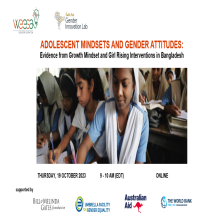
Adolescent Mindsets and Gender Attitudes: Evidence from Growth Mindset and Girl Rising Interventions in Bangladesh
COVID-19 disrupted schooling globally, and adolescents in Bangladesh fared particularly badly with nearly two years of school closures.They also experienced increased food insecurity, anxiety, and mental health issues. This webinar presents findings from an impact evaluation of phone-based outreach to adolescents during COVID-related school closures in Bangladesh. Two types of interventions were tested: one group received Growth Mindset outreach that promotes the idea that intellectual ability is not innate and can be built overtime; the other group received Growth Mindset plus Girl Rising, which sensitizes recipients to the value of girls' education. Delivered through group phone calls with 2-3 peers and a trained facilitator, these low-cost interventions increased the likelihood of re-enrollment in school and reported time spent studying, and improved test scores for boys (but not girls) and attachment to schooling – decreasing likelihood of early marriage among girls by 70% and paid work among boys by 55%. In this webinar, authors will discuss how the interventions were implemented, their impacts, the extent to which girls and boys responded differently, and lessons for future replications and scale-up.
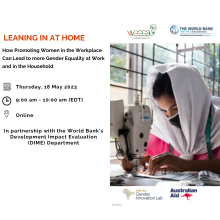
Leaning in at Home: How Promoting Women in the Workplace Can Lead to More Gender Equality at Work and in the Household
Throughout the world, women continue to be underrepresented in supervisory or management roles, which keeps them from fulfilling their economic potential. However, little is known about what works to promote women in the workplace and what effects female career advancement may have on roles in the family. In this webinar, the Women’s Economic Empowerment in South Asia (WEESA) Community of Practice and the South Asia Gender Innovation Lab (SAR GIL), in partnership with the World Bank's Development Impact Evaluation (DIME) department will offer evidence from field experiments in Bangladesh’s garment industry which shows the importance of soft skills and attitudes in the process of selecting and training female supervisors
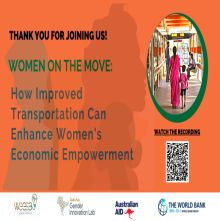
Women On The Move: How Mobility Can Enhance Women's Economic Empowerment
Lack of safe mobility remains a major constraint for women's economic empowerment. On March 29, 2923, WEESA hosted a webinar titled "Women on the Move: How Mobility Can Enhance Women's Economic Empowerment". Participants discussed seminal research on the cost of harassment on women's choice of colleges, gender-sensitive urban planning, and urban sprawls, as well as a World Bank toolkit to foster gender-responsive urban mobility.
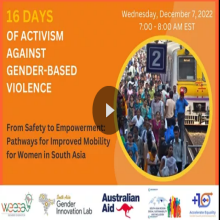
From Safety to Empowerment Pathways for Improved Mobility for Women in South Asia
South Asia had the second lowest female labor force participation (FLFP) globally as of 2019. Across the region, gender disparities are stark with over 23 % for women (compared to 77% for men) in the labor force. Restricted mobility is a key hurdle reducing women’s freedom to invest in human capital and to access quality jobs. Importantly, improving mobility goes beyond improving connectivity. For women, it is often about preventing sexual harassment in public transport and spaces. Alarming percentages of women and girls report being sexually harassed in public spaces and public transport in South Asia. Research done in the region confirms that perceptions of safety in public places have an important impact on women’s decision of whether or not to take up work outside the home and if and where to study.
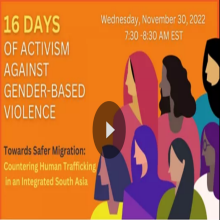
Towards Safer Migration: Countering Human Trafficking in an Integrated South Asia
Human trafficking is a multi-billion-dollar industry globally and a leading human rights challenge that disproportionally affects women and youth. A significant problem across South Asia, typical practices of human traffickers include exploiting individuals who are seeking to migrate to neighboring countries looking for economic opportunities. The United Nations Office on Drugs and Crime estimates that over 150,000 people are trafficked annually in South Asia—women and girls make up 44% and 21%, respectively, of trafficking victims. Forced labor, sexual exploitation, and forced marriage are recorded as the most common forms of trafficking in the region
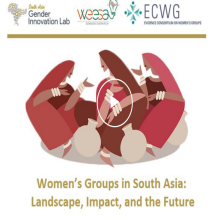
Women's Groups in South Asia: Landscape, Impact, and the Future
Women’s groups include self-help groups (SHGs), livelihoods groups, producer collectives, and other groups formed with social action, health, and empowerment objectives. Women’s groups are widespread in South Asia where they are instrumental in generating economic opportunities and enhancing women’s well-being. The existing literature highlights promising evidence of positive impacts of some women’s group types on women’s economic, political, reproductive, and social empowerment. However, the women’s groups’ objectives differ as do their results.
